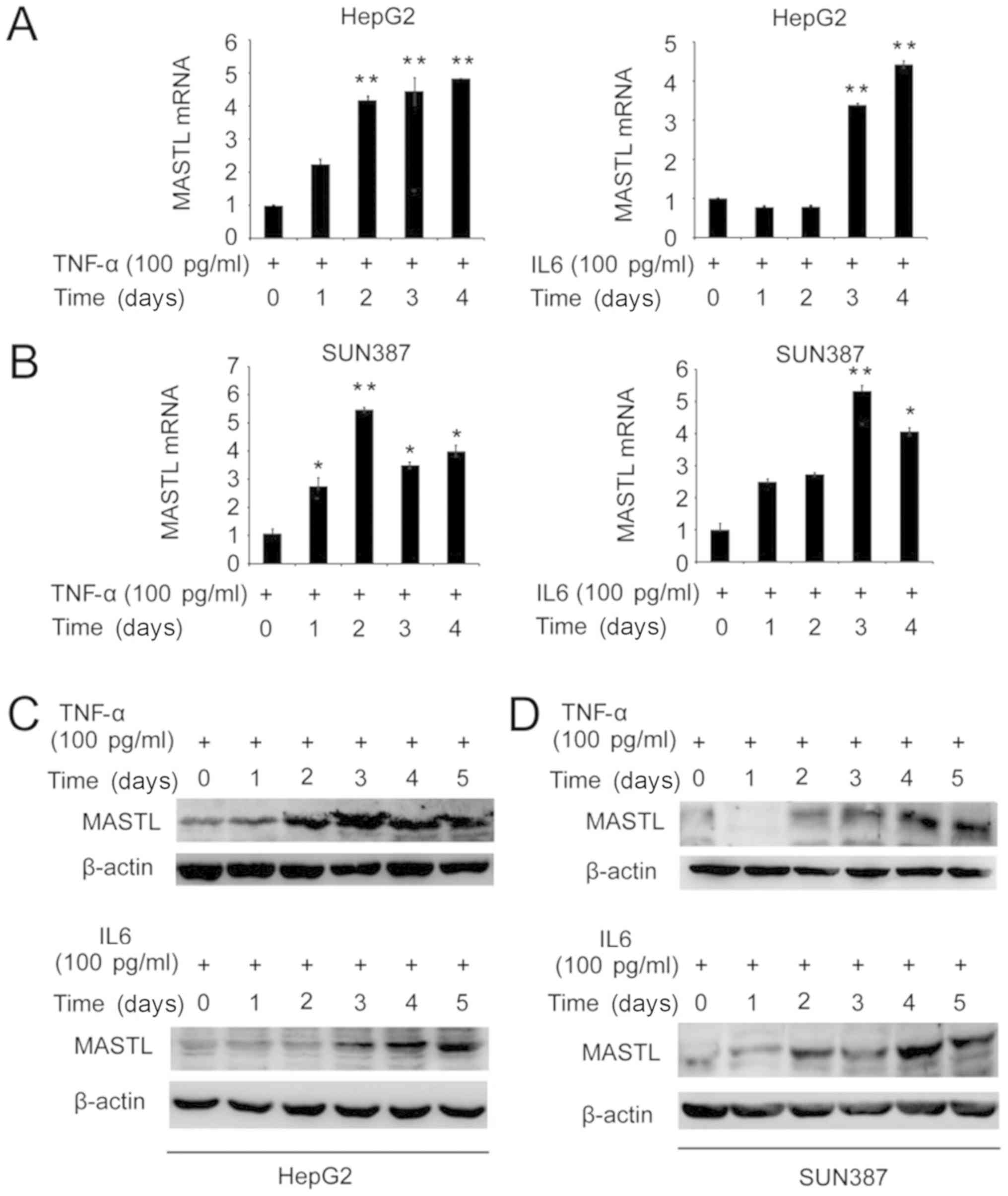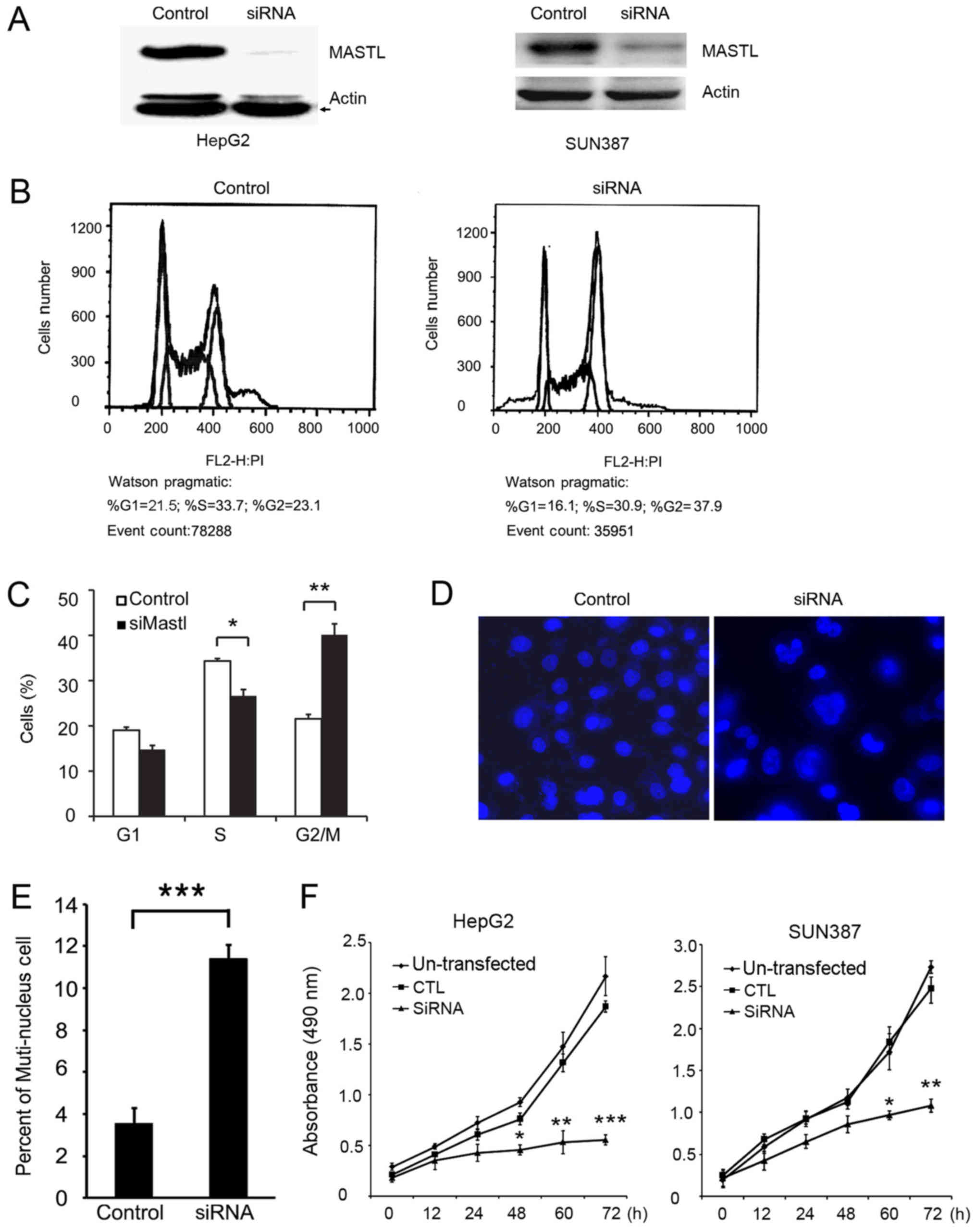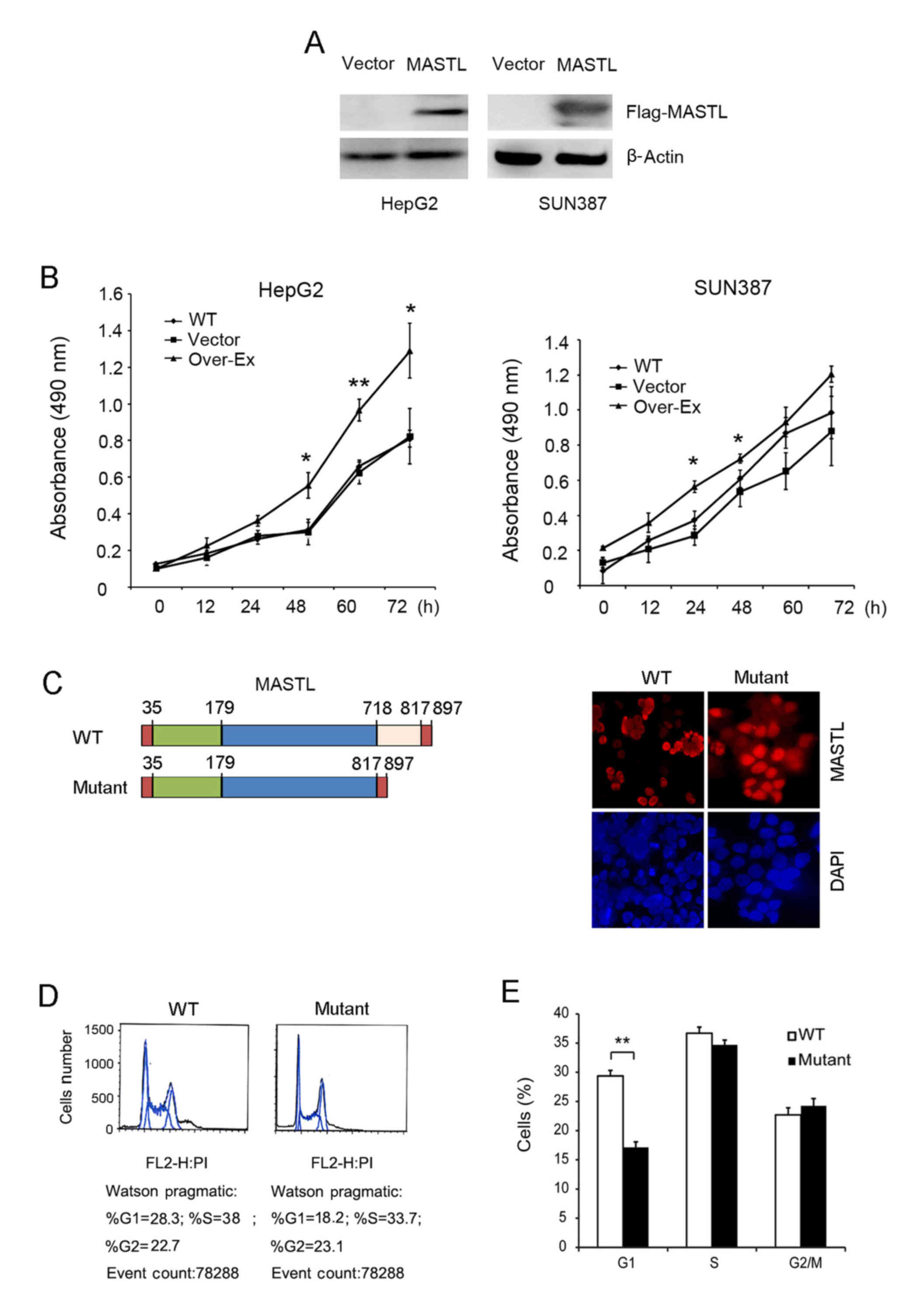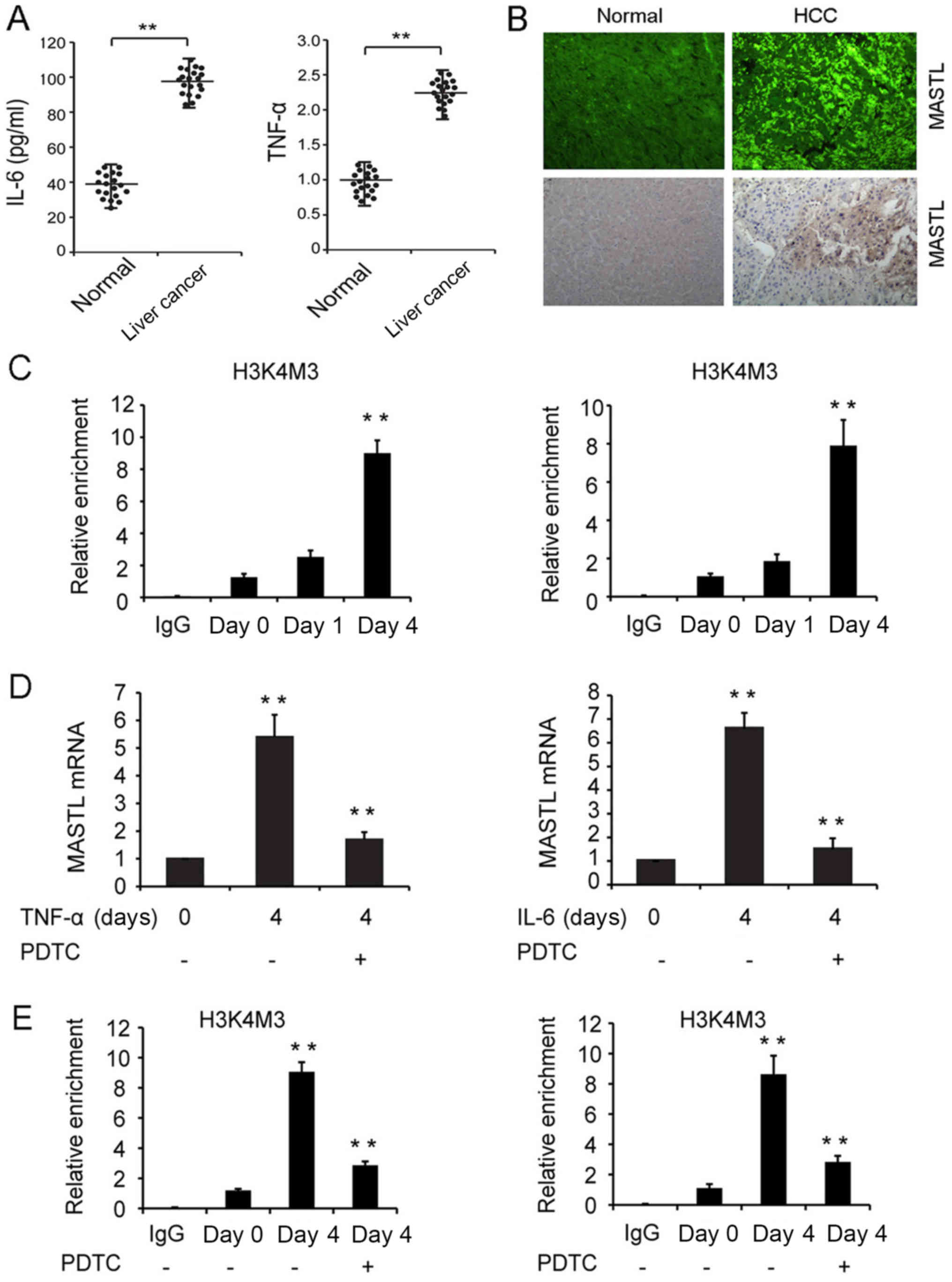|
1
|
Nasmyth K: Viewpoint: Putting the cell
cycle in order. Science. 274:1643–1645. 1996. View Article : Google Scholar : PubMed/NCBI
|
|
2
|
Murray AW: Recycling the cell cycle:
Cyclins revisited. Cell. 116:221–234. 2004. View Article : Google Scholar : PubMed/NCBI
|
|
3
|
Davydenko O, Schultz RM and Lampson MA:
Increased CDK1 activity determines the timing of
kinetochore-microtubule attachments in meiosis I. J Cell Biol.
202:221–229. 2013. View Article : Google Scholar : PubMed/NCBI
|
|
4
|
Chang HY, Jennings PC, Stewart J, Verrills
NM and Jones KT: Essential role of protein phosphatase 2A in
metaphase II arrest and activation of mouse eggs shown by okadaic
acid, dominant negative protein phosphatase 2A, and FTY720. J Biol
Chem. 286:14705–14712. 2011. View Article : Google Scholar : PubMed/NCBI
|
|
5
|
Yu J, Fleming SL, Williams B, Williams EV,
Li Z, Somma P, Rieder CL and Goldberg ML: Greatwall kinase: A
nuclear protein required for proper chromosome condensation and
mitotic progression in Drosophila. J Cell Biol. 164:487–492. 2004.
View Article : Google Scholar : PubMed/NCBI
|
|
6
|
Wang P, Malumbres M and Archambault V: The
Greatwall-PP2A axis in cell cycle control. Methods Mol Biol.
1170:99–111. 2014. View Article : Google Scholar : PubMed/NCBI
|
|
7
|
Cundell MJ, Bastos RN, Zhang T, Holder J,
Gruneberg U, Novak B and Barr FA: The BEG (PP2A-B55/ENSA/Greatwall)
pathway ensures cytokinesis follows chromosome separation. Mol
Cell. 52:393–405. 2013. View Article : Google Scholar : PubMed/NCBI
|
|
8
|
Voets E and Wolthuis RM: MASTL is the
human orthologue of Greatwall kinase that facilitates mitotic
entry, anaphase and cytokinesis. Cell Cycle. 9:3591–3601. 2010.
View Article : Google Scholar : PubMed/NCBI
|
|
9
|
Nagel R, Stigter-van Walsum M, Buijze M,
van den Berg J, van der Meulen IH, Hodzic J, Piersma SR, Pham TV,
Jiménez CR, van Beusechem VW and Brakenhoff RH: Genome-wide siRNA
screen identifies the radiosensitizing effect of downregulation of
MASTL and FOXM1 in NSCLC. Mol Cancer Ther. 14:1434–1444. 2015.
View Article : Google Scholar : PubMed/NCBI
|
|
10
|
Johnson HJ, Gandhi MJ, Shafizadeh E,
Langer NB, Pierce EL, Paw BH, Gilligan DM and Drachman JG: In vivo
inactivation of MASTL kinase results in thrombocytopenia. Exp
Hematol. 37:901–908. 2009. View Article : Google Scholar : PubMed/NCBI
|
|
11
|
El-Serag HB and Rudolph KL: Hepatocellular
carcinoma: Epidemiology and molecular carcinogenesis.
Gastroenterology. 132:2557–2576. 2007. View Article : Google Scholar : PubMed/NCBI
|
|
12
|
Grivennikov SI, Greten FR and Karin M:
Immunity, inflammation, and cancer. Cell. 140:883–899. 2010.
View Article : Google Scholar : PubMed/NCBI
|
|
13
|
Hoshida Y, Toffanin S, Lachenmayer A,
Villanueva A, Minguez B and Llovet JM: Molecular classification and
novel targets in hepatocellular carcinoma: Recent advancements.
Semin Liver Dis. 30:35–51. 2010. View Article : Google Scholar : PubMed/NCBI
|
|
14
|
Hartwell LH and Kastan MB: Cell cycle
control and cancer. Science. 266:1821–1828. 1994. View Article : Google Scholar : PubMed/NCBI
|
|
15
|
Chaturvedi P, Eng WK, Zhu Y, Mattern MR,
Mishra R, Hurle MR, Zhang X, Annan RS, Lu Q, Faucette LF, et al:
Mammalian Chk2 is a downstream effector of the ATM-dependent DNA
damage checkpoint pathway. Oncogene. 18:4047–4054. 1999. View Article : Google Scholar : PubMed/NCBI
|
|
16
|
Zeng JZ, Wang HY, Chen ZJ, Ullrich A and
Wu MC: Molecular cloning and characterization of a novel gene which
is highly expressed in hepatocellular carcinoma. Oncogene.
21:4932–4943. 2002. View Article : Google Scholar : PubMed/NCBI
|
|
17
|
Bishayee A: The role of inflammation and
liver cancer. Adv Exp Med Biol. 816:401–435. 2014. View Article : Google Scholar : PubMed/NCBI
|
|
18
|
Hodge DR, Hurt EM and Farrar WL: The role
of IL-6 and STAT3 in inflammation and cancer. Eur J Cancer.
41:2502–2512. 2005. View Article : Google Scholar : PubMed/NCBI
|
|
19
|
Pfaffi MW: A new mathematical model for
relative quantification in real-time RT-PCR. Nucleic Acids Res.
29:e452001. View Article : Google Scholar : PubMed/NCBI
|
|
20
|
El-Serag HB: Hepatocellular carcinoma. N
Engl J Med. 365:1118–1127. 2011. View Article : Google Scholar : PubMed/NCBI
|
|
21
|
Naugler WE, Sakurai T, Kim S, Maeda S, Kim
K, Elsharkawy AM and Karin M: Gender disparity in liver cancer due
to sex differences in MyD88-dependent IL-6 production. Science.
317:121–124. 2007. View Article : Google Scholar : PubMed/NCBI
|
|
22
|
Park EJ, Lee JH, Yu GY, He G, Ali SR,
Holzer RG, Osterreicher CH, Takahashi H and Karin M: Dietary and
genetic obesity promote liver inflammation and tumorigenesis by
enhancing IL-6 and TNF expression. Cell. 140:197–208. 2010.
View Article : Google Scholar : PubMed/NCBI
|
|
23
|
He G, Dhar D, Nakagawa H, Font-Burgada J,
Ogata H, Jiang Y, Shalapour S, Seki E, Yost SE, Jepsen K, et al:
Identification of liver cancer progenitors whose malignant
progression depends on autocrine IL-6 signaling. Cell. 155:384–396.
2013. View Article : Google Scholar : PubMed/NCBI
|
|
24
|
Iliopoulos D, Hirsch HA and Struhl K: An
epigenetic switch involving NF-kappaB, Lin28, Let-7 MicroRNA, and
IL6 links inflammation to cell transformation. Cell. 139:693–706.
2009. View Article : Google Scholar : PubMed/NCBI
|
|
25
|
Pilati C, Amessou M, Bihl MP, Balabaud C,
Nhieu JT, Paradis V, Nault JC, Izard T, Bioulac-Sage P, Couchy G,
et al: Somatic mutations activating STAT3 in human inflammatory
hepatocellular adenomas. J Exp Med. 208:1359–1366. 2011. View Article : Google Scholar : PubMed/NCBI
|
|
26
|
Mochida S, Maslen SL, Skehel M and Hunt T:
Greatwall phosphorylates an inhibitor of protein phosphatase 2A
that is essential for mitosis. Science. 330:1670–1673. 2010.
View Article : Google Scholar : PubMed/NCBI
|
|
27
|
Gharbi-Ayachi A, Labbé JC, Burgess A,
Vigneron S, Strub JM, Brioudes E, Van-Dorsselaer A, Castro A and
Lorca T: The substrate of Greatwall kinase, Arpp19, controls
mitosis by inhibiting protein phosphatase 2A. Science.
330:1673–1677. 2010. View Article : Google Scholar : PubMed/NCBI
|
|
28
|
Burgess A, Vigneron S, Brioudes E, Labbé
JC, Lorca T and Castro A: Loss of human Greatwall results in G2
arrest and multiple mitotic defects due to deregulation of the
cyclin B-Cdc2/PP2A balance. Proc Natl Acad Sci USA.
107:12564–12569. 2010. View Article : Google Scholar : PubMed/NCBI
|
|
29
|
Ghosh S and Karin M: Missing pieces in the
NF-kappaB puzzle. Cell 109 (Suppl). S81–S96. 2002.
|
|
30
|
Xing S, Zhang B, Hua R, Tai WC, Zeng Z,
Xie B, Huang C, Xue J, Xiong S, Yang J, et al: URG4/URGCP enhances
the angiogenic capacity of human hepatocellular carcinoma cells in
vitro via activation of the NF-κB signaling pathway. BMC Cancer.
15:3682015. View Article : Google Scholar : PubMed/NCBI
|
|
31
|
Wang Y, Tu Q, Yan W, Xiao D, Zeng Z,
Ouyang Y, Huang L, Cai J, Zeng X, Chen YJ and Liu A: CXC195
suppresses proliferation and inflammatory response in LPS-induced
human hepatocellular carcinoma cells via regulating
TLR4-MyD88-TAK1-mediated NF-κB and MAPK pathway. Biochem Biophys
Res Commun. 456:373–379. 2015. View Article : Google Scholar : PubMed/NCBI
|
|
32
|
Lu X, Ma P, Shi Y, Yao M, Hou L, Zhang P
and Jiang L: NF-κB increased expression of 17β-hydroxysteroid
dehydrogenase 4 promotes HepG2 proliferation via inactivating
estradiol. Mol Cell Endocrinol. 401:1–11. 2015. View Article : Google Scholar : PubMed/NCBI
|
|
33
|
He G and Karin M: NF-κB and STAT3-key
players in liver inflammation and cancer. Cell Res. 21:159–168.
2011. View Article : Google Scholar : PubMed/NCBI
|
|
34
|
Yu J, Zhao Y, Li Z, Galas S and Goldberg
ML: Greatwall kinase participates in the Cdc2 autoregulatory loop
in Xenopus egg extracts. Mol Cell. 22:83–91. 2006. View Article : Google Scholar : PubMed/NCBI
|
|
35
|
Qian Y and Chen X: Tumor suppression by
p53: Making cells senescent. Histol Histopathol. 25:515–526.
2010.PubMed/NCBI
|
|
36
|
Hanahan D and Weinberg RA: The hallmarks
of cancer. Cell. 100:57–70. 2000. View Article : Google Scholar : PubMed/NCBI
|
|
37
|
Hermeking H: MicroRNAs in the p53 network:
Micromanagement of tumour suppression. Nat Rev Cancer. 12:613–626.
2012. View Article : Google Scholar : PubMed/NCBI
|
|
38
|
Lorca T and Castro A: The Greatwall
kinase: A new pathway in the control of the cell cycle. Oncogene.
32:537–543. 2013. View Article : Google Scholar : PubMed/NCBI
|


















